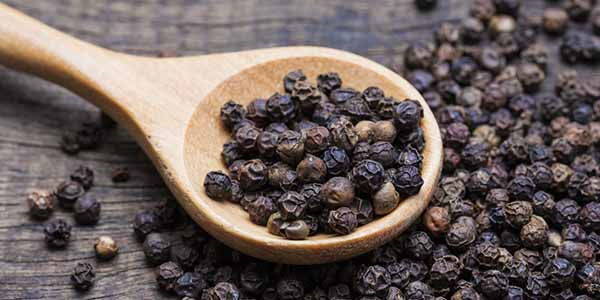We all have black pepper at home that we use to add that extra touch of flavor to our favorite dishes. However, we do not always know the properties of this spice and what happens to the body by taking it every day.
Don't store avocado like this: it's dangerousWe all have the black pepper that we use to give that extra touch of flavor to our favorite dishes. However, we do not always know the properties of this spice and what happens to the body by taking it every day.
From the fruits of the Piper nigrum plant, blanched and then dried in the sun for several days, we get the black peppercorns that we all know and use. The virtues of this spice are due to the presence of piperine, an active ingredient beneficial for our health which, among other things, increases the absorption of some substances within the body.
Since ancient times, black pepper has been used not only in cooking but also in folk medicine recipes for healing purposes. But what are the real benefits of a daily intake of black pepper?
Index
What happens to the body every time we take black pepper

There are several changes that we could notice on our body if we take black pepper daily, obviously in the right dose and without exaggerating in order not to incur possible side effects. Here are the main benefits, also supported by some scientific research:
- Better digestion: pepper has a strong digestive power, this is due to the action of piperine which stimulates the gastric juices. Not only sprinkled on food but also taken in the form of herbal tea can best express this property.
- Fat burning: pepper is a very useful spice for dieters as it has been shown that it improves metabolism and contributes to the disposal of fats that do not accumulate.
- Less intestinal gas: alongside a more effective digestion you can also notice an improvement in the case of problems of meteorism and swollen belly. In fact, black pepper helps to deflate and reabsorb intestinal gas.
- Better nutrient absorption: piperine improves the absorption of some nutrients found in food. Known and recommended the combination with turmeric of which pepper improves bioavailability. All this is documented by a study published in the scientific journal Breast Cancer Research and Treatment which also demonstrated its ability, always associated with turmeric, to block the growth of breast cancer cells.
- Relieves Pain: black pepper has a good analgesic capacity, its effect can be experienced for example in case of muscle and joint pain.
- Fights free radicals: pepper is rich in antioxidants and therefore helps the cells, and consequently the whole organism, to stay young.
- Disinfect foods: given its antiseptic qualities, in ancient times pepper was used to preserve food and make it safer from a hygienic point of view. Even today this spice can help counteract some bacteria potentially present on the foods we eat but also those that are inside the intestine.
- Reduces blood glucose spikes and improves insulin sensitivity: this spice is particularly suitable for those suffering from diabetes and need to keep blood sugar under control: several studies conducted both on animals and on patients with type 2 diabetes have demonstrated the ability of black pepper to reduce the amount of sugar in the blood.
- Antidepressant: pepper is able to rebalance the secretion of serotonin and dopamine. This is why it is considered a good natural antidepressant.
- Aphrodisiac: a pinch of pepper can help spice up the atmosphere even under the sheets.
- Less salt: adding pepper to our foods, as well as other spices, has the advantage of helping to reduce the use of salt. However, you must be careful not to overdo it as black pepper also contains sodium.
Black pepper, how much to take every day?
Black pepper in small doses is beneficial while taken excessively it can become irritating to the mucous membranes, especially in particularly sensitive subjects. Spreading a pinch of pepper on food every day is enough to reap the benefits.
The best way to enjoy its properties is to use fresh peppercorns to be ground on the spot so that they keep all their nutritional components at their best. It is important to always add it to hot foods after cooking (high temperatures ruin its characteristics) and never expose it to sunlight.
Black pepper, how to include it in the diet
Black pepper goes well with many foods and it is not difficult to include it in your diet as long as you like its spicy flavor. It can be added to dishes based on meat, fish, cheese, vegetables but there are those who can also successfully combine it with dried fruit and chocolate (think for example of gingerbread).
You also notice the spice mixes used in different parts of the world where the presence of black pepper is never lacking. We remember, for example, curry and garam masala. As we have already said, a pinch of pepper should always be added to turmeric in order to increase the bioavailability of the main active ingredient of the queen of spices “curcumin”.

Contraindications of black pepper
Black pepper can also be an irritating spice, which is why it should always be taken without exaggerating and in some specific cases it is not recommended. For example, if you suffer from stomach diseases such as gastritis or ulcer or other problems due to gastric hypersensitivity it would be good to just avoid it, unless otherwise advised by a doctor. Also not recommended for those with hemorrhoids or fissures.
If you follow a low-sodium diet it is good to limit or avoid pepper as, few people know, this spice contains sodium. The intake of pepper is also not recommended for the elderly and children.
Then pay attention to the possible inhalation, black pepper can also irritate the respiratory tract and in some cases create difficulty in breathing and swelling.
On black pepper you might also be interested in:
-
Black pepper helps burn fat. Confirmation in an Indian study
-
Black pepper: properties, benefits, history and how to best use it
-
Why Does Pepper Make You Sneeze? (VIDEO)
-
Pepper: properties and uses in natural cooking, Ayurvedic medicine and nutritional biotherapy


























